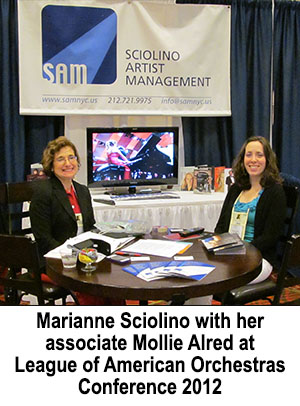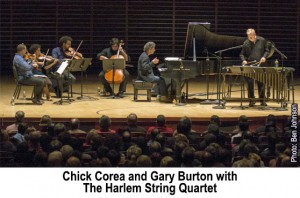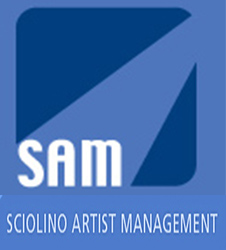What follows is the second half of my interview with Marianne Sciolino, Executive Director of Sciolino Artist Management. Last week Ms. Sciolino described the eight year trek to create her company from scratch. This week she describes the skills needed to make the journey in a tough business.
******************************************************************************
MARLOW: Of all the skills and characteristics that you need to have done what you’ve done, could you identify the top three?
SCIOLINO: Yes. The ability to identify talent, and I don’t mean just artistic talent. I mean skills that you don’t have and not to feel threatened by that. Chester, my husband, can  do things that I can’t do in a million years. He hears things that I can’t hear. Mollie Alred, my associate in the company, has management and leadership skills that are quite extraordinary for a young lady of 27 years old. She is calm in the face of chaos. Not that I’m so talented, my biggest skill is that I’m able to recognize talent—artistic talent or managerial talent. Ironically, when I was a teenager I used to say, “Gee, I’m like Ed Sullivan.” I always had this talent but I never knew really how to put the pieces together till I was in my fifties.
do things that I can’t do in a million years. He hears things that I can’t hear. Mollie Alred, my associate in the company, has management and leadership skills that are quite extraordinary for a young lady of 27 years old. She is calm in the face of chaos. Not that I’m so talented, my biggest skill is that I’m able to recognize talent—artistic talent or managerial talent. Ironically, when I was a teenager I used to say, “Gee, I’m like Ed Sullivan.” I always had this talent but I never knew really how to put the pieces together till I was in my fifties.
You asked for three? That’s number one. Number two, I was going to say I’m absolutely fearless, but I often feel “I can’t do this,” but then I say, “Yes, you’re going to do this.” You will walk up to this person at this conference and introduce yourself to this person. I think it’s comparable to an artist going up on stage and pulling out that violin and getting up there and performing and do it every time. Yes, I’m fearless with a little asterisk.
Number three? I try to be an ethical individual. There’s always judgment calls involved. Sometimes I don’t always get things right. We really, really try hard to have our values in the right place in terms of how we treat our artists, how we treat each other, and how we treat the presenters and the orchestras with which we do business.
MARLOW: Do I presume correctly that you work with outside public relations (PR) and marketing firms?
SCIOLINO: Actually, that’s a good question. Most of my artists do not have outside promotional firms. I’m sort of a jack of all trades. I’m a manager, I’m also an agent, which means I do the booking, I guide careers. Having said that, most of my artists are junior. Carter Brey doesn’t really need PR, Misha Dichter had PR until recently and decided to drop it. It’s very expensive and made that decision recently. Some of my artists are beginning to explore using outside PR, but it’s extremely expensive, so we’re waiting until they have enough income so that they can afford to start to do that. I don’t do PR, I don’t have a list of media representatives. I have some people of course, but not a comprehensive list that Mary Lou Falcone would have. But we do send out really, really sharp looking blast emails that go out to the orchestras and the presenters. And then we do a lot of Facebook and Twittering to the extent that we can use social media.
MARLOW: Give me an example of your greatest success in terms of managing or guiding someone’s career.
 SCIOLINO: Off the top of my head, getting the tour of The Harlem String Quartet and jazz pianist Chick Corea. The Harlem String Quartet collaborated with Chick Corea when he was honored at Chamber Music America (CMA) conference a few years back. And I really have to thank Adina Williams and Laura Hartman who recommended The Harlem String Quartet to perform with Chick Corea. That was their doing, not mine. They put their reputations on the line by going to Chick. That was for the final performance that ends the CMA Conference. They played two movements of his five movement “The Adventures of Hippocrates” which was a huge success and Chick was thrilled and told the quartet he wanted to collaborate with them. That was no easy feat.
SCIOLINO: Off the top of my head, getting the tour of The Harlem String Quartet and jazz pianist Chick Corea. The Harlem String Quartet collaborated with Chick Corea when he was honored at Chamber Music America (CMA) conference a few years back. And I really have to thank Adina Williams and Laura Hartman who recommended The Harlem String Quartet to perform with Chick Corea. That was their doing, not mine. They put their reputations on the line by going to Chick. That was for the final performance that ends the CMA Conference. They played two movements of his five movement “The Adventures of Hippocrates” which was a huge success and Chick was thrilled and told the quartet he wanted to collaborate with them. That was no easy feat.
Initially, Corea’s people would not answer our calls. I kept e-mailing them. Nothing, nada. It just wasn’t happening. Chick was performing at Blue Note and this is where my chutzpa comes in. I went down there. I had no money. I ordered a Diet Coke, and sipped on it for an entire performance. And at the Blue Note you’re crunched into these seats with your knees up to your nose for the entire performance and afterwards I ran up the stairs and you go to the Green Room in the back, and there was his manager and I really pitched the Harlem Quartet. Everybody wants to make this happen. How do we make this happen? That was the turning point. Chick said to his manager “Make sure you get in touch with her.” One thing led to another and we finally got to the collaboration and that led to the quartet going on the Hothouse Tour with Chick, doing a couple of recordings, the second of which won two Grammys. One of the cuts on the Hothouse CD was “Mozart Goes Dancing” in which the Harlem Quartet was featured. They were one step away from winning a Grammy.
The members of the string quartet are all conservatory trained but they’re also extremely talented jazz musicians. So, they play classical and jazz. They all improvise. They’ve commissioned a new work for string quartet based on Leonard Bernstein’s score for “West Side Story.” It will be released on the Cedille label out of Chicago. The Chicago Sinfonietta is the orchestra. Cedille produced the album. We have a royalty agreement with them.
MARLOW: What does the future look like?
 SCIOLINO: I’m looking at a pretty bright future. We’re increasingly getting credibility among the orchestras, among the venues. I’m just starting to crack into the European, the UK management establishments which is really difficult to do. I now have three European/UK Management firms looking into violinist Elena Urioste. It’s a constant working at it; shattering glass is the image that comes to mind. As we all know, this is really a tough business. Music is struggling, but I’m always optimistic about it. If I’m shrewd, use my time wisely, if I’m really well organized, I’ll build a reputation of being an ethical, smart player in the market, we’ll do better and better.
SCIOLINO: I’m looking at a pretty bright future. We’re increasingly getting credibility among the orchestras, among the venues. I’m just starting to crack into the European, the UK management establishments which is really difficult to do. I now have three European/UK Management firms looking into violinist Elena Urioste. It’s a constant working at it; shattering glass is the image that comes to mind. As we all know, this is really a tough business. Music is struggling, but I’m always optimistic about it. If I’m shrewd, use my time wisely, if I’m really well organized, I’ll build a reputation of being an ethical, smart player in the market, we’ll do better and better.
Anybody who’s thinking about going into this business should have very realistic expectations. It’s not an easy business. But I will say that it is a fabulously rewarding business. I’ve had three careers. My first one was Spanish professor, then finance, and now this one. When I was working in finance in a small office in Manhattan, I knew it wasn’t a good fit. It was the beginning of my trying to figure out what to do next. And one of my colleagues said to me, “You know there’s not one guy in this place who’s gay.” And I said, “Gee, John, how do you know that?” And he said, “Well, everyone here is either married or has a significant other.” And I said, “Well, what does that matter? I mean, look at Leonard Bernstein.” And he said, “Who’s Leonard Bernstein?” I remember saying to myself, I’m no big intellectual, but I can’t do this anymore. I’ve got to get out. It was a long road after that, but I’ve managed to do it. I’m doing what I love. I’m passionate about it. I hope to be doing it for many, many years going forward. And I hope I never have to tell anyone else who Leonard Bernstein was.
******************************************************************************
Please write to me at meiienterprises@aol.com if you have any comments on this or any other of my blogs.
Eugene Marlow, Ph.D.
September 23, 2013
© Eugene Marlow 2013


